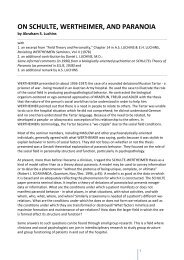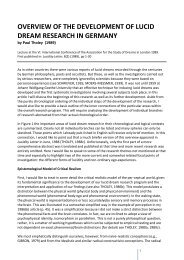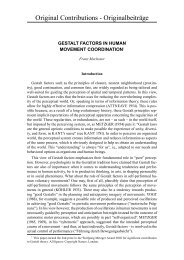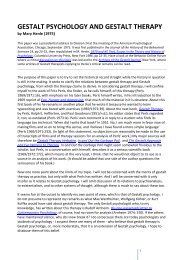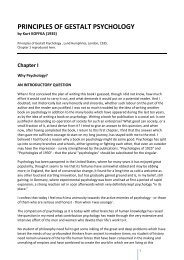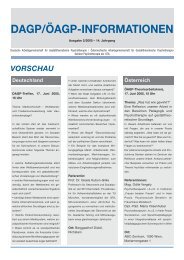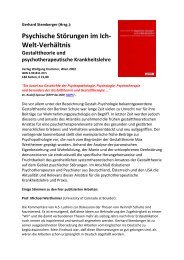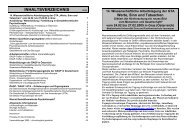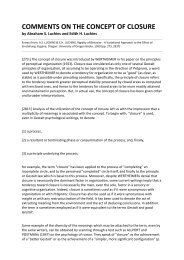pdf-Download - Society for Gestalt Theory and its Applications (GTA)
pdf-Download - Society for Gestalt Theory and its Applications (GTA)
pdf-Download - Society for Gestalt Theory and its Applications (GTA)
You also want an ePaper? Increase the reach of your titles
YUMPU automatically turns print PDFs into web optimized ePapers that Google loves.
Only data which can be observed <strong>and</strong> recorded from outside may be used in psychoogy if it is<br />
supposed to be scientific psychology. Psychology can cope with <strong>its</strong> ambition to be an empirical<br />
science only as a science of behaviour.<br />
This is not a hypothesis concerning the facts of psychology; rather, it is a methodic rule, or, more<br />
clearly, a prohibition to evaluate certain data because of their lack of reliability.<br />
2. The Principle of Passivity or of Primary Reactivity<br />
The psycho-physical organism starts to function only because of external influence. Thus, the<br />
objective of the science of behaviour is to assess the relations between the influences from<br />
outside (stimuli or situations, "S") <strong>and</strong> the reactions towards the outside world (responses, "R"),<br />
i.e., the "S-R-relation". The reactions R, bring about a mostly new situation resp. a new kind of<br />
influence S2; thus, the elementary relation as a whole may be symbolized as S1-R-S2.<br />
3. The Principle of Genetic Identity of Psycho-physical Systems<br />
The hereditary or innate psychic outfit is the same <strong>for</strong> all men, if not <strong>for</strong> all verebrata. There<strong>for</strong>e,<br />
<strong>for</strong> experimental research of human behaviour, doves or rats may be used.<br />
4. The Principle of Minimum Genetic Outfit (of Tabula Rasa)<br />
Without taking into account some elementary reflexes, there are no hereditary relations between<br />
the influences S <strong>and</strong> the reactions R. All differences in reactions R are the result of previous<br />
differences in the surroundings S (i.e., S from birth till the respective moment): milieu theory or<br />
environmentalism. What a person knows, he has learned during his individual existence. The<br />
capability of learning is the basic property of the psychic. Theoretical psychology is basically a<br />
theory of learning.<br />
Principles (3) <strong>and</strong> (4) <strong>for</strong>m together the doctrine called empiricism since the 18th century.<br />
5. The Principles of Elementarism <strong>and</strong> Connectionism<br />
Learning is a process of <strong>for</strong>mation of connections between elementary facts, of in<strong>for</strong>cement of<br />
such connections or of weakening or extinction of connections already existing.<br />
6. The Principle of Contiguity (Principle of Contact)<br />
The decisive condition <strong>for</strong> any connection is time-space vicinity, if possible, repeated many times.<br />
7. The Principle of Contingency of Arbitrariness<br />
There is no principle of connection <strong>for</strong>mation but <strong>for</strong> that of contingency; that means that chance<br />
or an arbitrary decision of the experimenter is the only decisive factor. The factual pertinency<br />
("matching", "mutual dem<strong>and</strong>edness") of the facts to be connected plays no role.<br />
Thus, no distinction is made between the attainment of a (desired) goal on one side (e.g., of a<br />
correct solution of a problem by following, without error, some suitable proceedings) <strong>and</strong> getting<br />
a pleasant reward (a piece of c<strong>and</strong>y) as a result of observing an arbitrary (prescribed by the<br />
experimenter) behaviour on the other side.<br />
3



